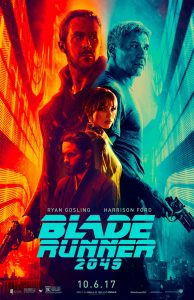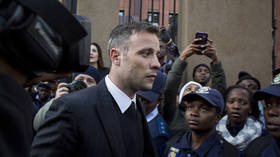Blade Runner 2049
It is dangerous work, making a sequel to a classic like Blade Runner, Ridley Scott’s 1982 magnum opus. French Canadian director Denis Villeneuve’s Blade Runner 2049 is a very good film, but it inevitably falls short of the original.
I first discovered Villeneuve’s work with his 2016 science fiction film Arrival (discussed with John Morgan here). Arrival impressed me as a highly imaginative science fiction film with an original visual style, told with an appealingly deliberate art-film pacing, with a stunning plot twist and a powerful emotional payoff. Villeneuve’s 2015 film Sicario is an excellent thriller/crime drama.
Blade Runner 2049 is more like Arrival than Sicario, and that is something of a problem. At 2 hours, 43 minutes, Blade Runner 2049 takes art-house pacing and style to Tarkovskyesque lengths. It is a real artistic gamble, and not an entirely successful one. I think this would have been a much more effective film — and yet also more commercial — if directed more like Sicario, i.e., edited down/sped up to 2 hours.
It would have been more like the original Blade Runner as well. I suspect, however, that Villeneuve may have rejected such a course because he felt intimidated by the prospect of doing a sequel that would invite too many comparisons with the original, so he struck out in a direction that would be more likely to please the sort of people who enjoy sitting through Solaris, Stalker, or 2001: A Space Odyssey. I generally like such movies, but I felt that Blade Runner 2049 runs out of steam near the end and fails to deliver the powerful emotional punch toward which it was building.
But this problem may have been inevitable, for there was probably no way of doing this movie without including Harrison Ford, and frankly, I wish they had done it without him, or pared his role down to a brief Yoda-like encounter where he imparts some useful information to the questing knight and then is left behind. I also wish they had replaced Ford with Ryan Gosling’s character for the third act, which would have eliminated all the gimpy appeals to nostalgia. I think a much more emotionally powerful conclusion could have been crafted with Gosling alone. (I won’t explain this point, because it would entail spoilers, but watch the movie, and you will see what I mean.)
Gosling, frankly, is ten times the actor that Ford is. Gosling’s performance as K, a replicant and a Blade Runner, is stunningly subtle and sensitive, whereas Ford is capable of nothing but being a two-fisted, hard-drinking, crotchety old scene-chewer. Frankly, after 3 minutes of screen time, I wanted to run him through with a light saber. (Science fiction will not be safe until the entire casts of the original Star Wars and Star Trek are dead.)
I liked most of the other performances in Blade Runner 2049, particularly Ana de Armas as Joi, Sylvia Hoeks as Luv, and Carla Juri as Ana Stelline. Jared Leto’s performance as the Mephistophelean businessman Niander Wallace doesn’t really compare to the original’s Eldon Tyrell, and frankly I don’t understand his behavior in the third act.
The script lacks the poetry and mythic dimension of the original, which is not just a sci-fi dystopia but an allegory about Satan’s rebellion against God — see my essay on this topic here — whereas here we just catch glimpses of a Marxist revolt of the masses. The film touches on the same issues of personal identity as the original, but does not add any depth to them.
Blade Runner 2049 extrapolates from the dystopia of the original, incorporating ecological elements from Philip K. Dick’s novel Do Androids Dream of Electric Sheep?. But other updates make no sense, such as the vast orphanage where predominantly white children dig through garbage. Isn’t this replicant work? And where are all these white orphans coming from? It doesn’t make sense that there are lots of surplus white children on an ecologically devastated planet.
The visual style of Blade Runner 2049 is stunning. Of course it is based on the original, but it develops it in interesting and original ways. The music by Hans Zimmer and Benjamin Wallfisch effectively incorporates Vangelis’ original themes.
Blade Runner 2049 is a very good movie. It held my attention for 2 hours and 43 minutes, but it lacked a powerful emotional payoff. It is good, but it could have been so much better. Still, it is definitely a movie that I will watch again. I recommend it to fans of Blade Runner and science fiction aficionados in general.
The Black (& White) Predicament: Harold Cruse...
Paleofuturism for the Man; Archeofuturism for the ...
Hitler or Judah?A Second Nuremberg Tribunal, Chapt...
Alain Daniélou’s Virtue, Success, Pleasure, ...
God-Emperor from a Machine:The Alt Right, Aestheti...
Remembering Sir Oswald Mosley: November 16, 1896 t...
Jacob “Jack” Lew:Obama’s Nominee...
On Russia, Ukraine & Honor




